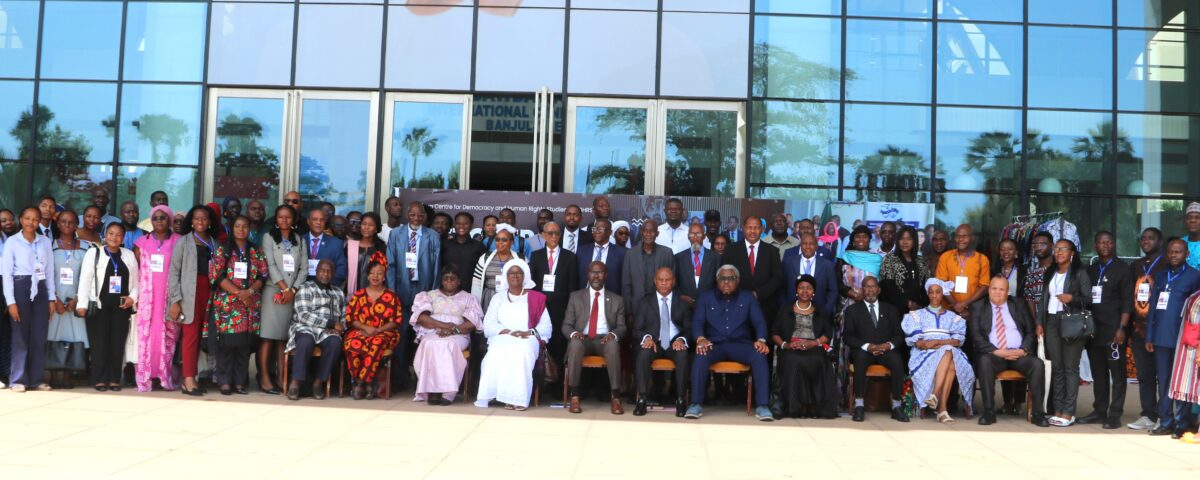The opening day of the Forum on the Participation of NGOs in the 85th Ordinary Session of the African Commission on Human and Peoples’ Rights convened government officials, civil society representatives, human rights defenders, and experts from across Africa and the diaspora. Organized by the African Centre for Democracy and Human Rights Studies (ACDHRS), the gathering set the tone for robust discussions on justice, reparations, and the protection of civic space across the continent.
The sessions explored the central theme, “Justice for Africans and People of African Descent through Reparations,” emphasizing that reparations must go beyond financial compensation to encompass acknowledgment, restitution, and institutional reform aimed at restoring the dignity of Africans and their descendants.
Opening Ceremony: A Call for Transformative Justice
The Forum opened with renewed calls for solidarity, unity, and concrete action toward reparative justice. Opening statements highlighted that reparations are a moral, historical, and developmental duty that must address both the enduring consequences of slavery and colonialism, and the contemporary injustices of corruption, displacement, and exclusion.
Speakers emphasized that achieving meaningful reparations requires systemic change — tackling the structural roots of inequality and ensuring the inclusion of women, youth, and marginalized communities in decision-making processes. The message was clear: reparations must not be symbolic gestures, but pathways to genuine healing, equity, and reform.
Inaugural Panel: Reparations – Justice for Africans and People of African Descent
The inaugural panel reaffirmed that reparations are an essential step toward justice and reconciliation. Discussions reflected on the enduring impact of slavery, colonialism, and systemic racism, urging African governments and institutions to adopt policies that address the deep social and economic scars left by centuries of exploitation.
Participants from various regions, including Mauritania, raised urgent concerns about ongoing repression and corruption, emphasizing that without justice and accountability, development and reconciliation remain elusive. The session concluded with a strong appeal for regional solidarity and institutional reform to drive the reparations agenda forward.
Panel 1: Human Rights and Democracy in Africa – Sub-Regional Updates
Regional focal points presented sobering updates on the human rights and democratic landscape across Africa.
- North Africa: Reports from Tunisia, Libya, Egypt, and Mauritania highlighted ongoing repression, judicial harassment, and violations against migrants and minorities.
- West Africa: Insecurity in the Sahel, arbitrary arrests, and cyber intimidation were identified as growing threats to civic freedoms in countries such as Burkina Faso, Guinea, and The Gambia.
- Central and Southern Africa: Calls were made for the release of political detainees, the repeal of repressive laws, and stronger constitutional protections.
Participants underscored the urgent need to strengthen regional accountability mechanisms to counter shrinking civic spaces and ensure respect for fundamental freedoms.
Panel 2: Accountability, Debt, and Illicit Financial Flows
The discussion on accountability and illicit financial flows (IFFs) linked corruption and debt to the erosion of human rights. Panelists called for the establishment of an independent rapporteur on debt, tax, and IFFs to promote financial transparency and justice.
They noted that illicit financial flows deprive African countries of billions in resources each year — funds that could otherwise be invested in healthcare, education, and social welfare. Participants advocated for debt cancellation, anti-corruption measures, and stronger governance systems to advance economic justice and sustainable development.
Panel 3: Civic Space Under Threat
Civil society actors raised alarms over the continued shrinking of civic space across Africa. The panel highlighted repressive laws, state intimidation, and targeted violence against journalists and human rights defenders.
Particular concern was expressed for women human rights defenders, who face gender-based violence and digital harassment. Recommendations included strengthening collective protection mechanisms, enhancing digital safety, and providing psychosocial support to activists.
The session called for greater solidarity among civil society organizations and urged the African Commission to hold governments accountable for violations of freedom of expression, association, and assembly.
Panel 4: Environmental Justice and Indigenous Peoples’ Rights
The discussion on environmental justice underscored the urgent need to protect communities disproportionately affected by climate change, pollution, and resource exploitation. Speakers emphasized that environmental rights and indigenous rights are deeply interconnected, as many communities depend directly on their natural environment for survival, culture, and identity.
Country examples — including oil exploration challenges in Senegal and the ongoing Ogoni crisis in Nigeria — illustrated how extractive industries often fuel displacement and inequality.
Participants urged governments to adopt inclusive climate policies, integrate traditional knowledge systems, and increase funding for grassroots environmental initiatives. The call was also made to declare an environmental emergency in Ghana, where water degradation has reached alarming levels.
Key Takeaways
- Reparations must encompass acknowledgment, restitution, and reform, not just financial compensation.
- Civic space is shrinking, with heightened risks for activists, journalists, and defenders.
- Corruption, illicit financial flows, and weak governance remain key barriers to justice and equality.
- Calls were made for debt cancellation, economic transparency, and rights-based financial reforms.
- Women and youth inclusion are essential for lasting peace and development.
- Protection mechanisms for women human rights defenders must be strengthened.
- Environmental and indigenous rights must be integrated into Africa’s justice and reparations agenda.
Conclusion
Day One of the NGO Forum underscored the urgency of collective action, accountability, and political will in advancing justice for Africans and people of African descent. It reaffirmed that reparations are not only about the past but also about reshaping Africa’s future — ensuring equality, dignity, and sustainable development for generations to come.


